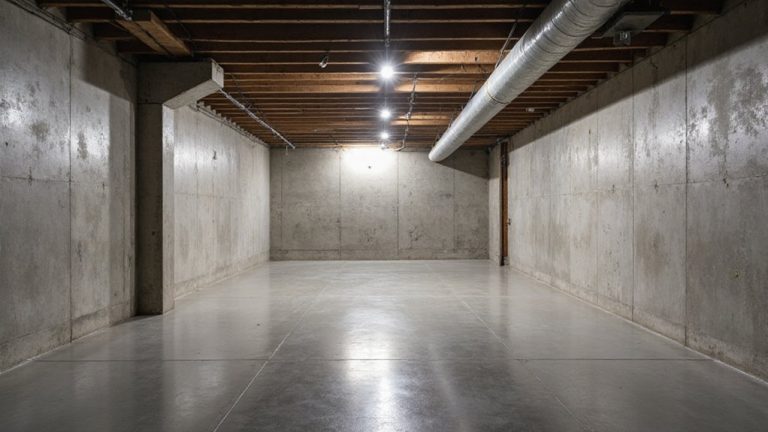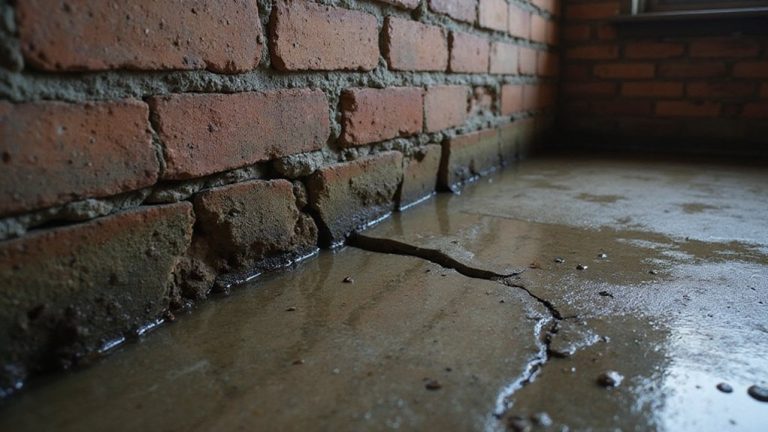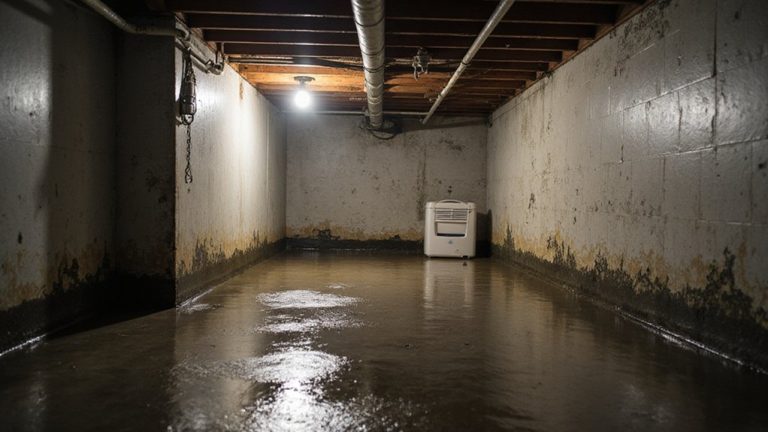Preparing your basement for heavy rain and flooding shouldn’t be disregarded. By taking proactive steps, you can secure your home and minimize the risk of costly water damage. Start by inspecting your foundation and ensuring your sump pump is in working order. Waterproofing your basement walls and optimizing drainage around your property are pivotal too. Keep reading to uncover more practical tips that can provide peace of mind and protect your living space.
Inspect Your Foundation
First, carefully inspect your home’s foundation for any cracks, gaps, or signs of deterioration. Use a flashlight to thoroughly check the exterior and interior walls of your basement for any visible damage. Foundation piers and wall anchoring can help stabilize your basement if you discover significant structural issues. Monitor moisture levels, as excess water can seep through cracks and lead to mold or structural issues. If you find any concerning cracks or signs of moisture, don’t panic – address them promptly to prevent further damage. Early detection and proper repairs can go a long way in protecting your basement from heavy rain and flooding. Stay vigilant, and act quickly to safeguard your home’s foundation.
Install a Sump Pump
If your basement has a history of flooding or excess moisture, installing a reliable sump pump should be one of your top priorities. A sump pump is a critical component in preventing water damage and maintaining a dry, comfortable living space. Foundation structural integrity relies on keeping water out and preventing potential damage from moisture accumulation.
When selecting a sump pump, consider the size of your basement and the anticipated water flow to guarantee you choose a model that can effectively handle the job. Regular maintenance is also key, as keeping your sump pump in good working order will help it perform at its best when you need it most.
- Choosing the right sump pump size for your basement
- Establishing a routine maintenance plan to keep your sump pump functioning
- Guaranteeing your sump pump is ready to handle heavy rain and flooding events
Waterproof Your Basement Walls
While a reliable sump pump is essential, waterproofing your basement walls can provide an extra layer of protection against water intrusion. Consider applying concrete sealers or basement waterproofing coatings to create a barrier against moisture. These specialized products form a water-resistant layer on the concrete, helping to prevent seepage and dampness.
Ensure Proper Drainage Around Your Home
Why is safeguarding proper drainage around your home so important when preparing for heavy rain and flooding? Proper drainage is pivotal to redirect water away from your home’s foundation and prevent basement flooding.
Guarantee proper soil grading: Slope the ground around your home so water flows away from the foundation, not towards it.
Install effective downspout extensions: Direct water from your gutters at least 6 feet away from your home’s walls.
Address any pooling or puddling areas: Fix uneven ground or install additional drainage solutions to eliminate standing water.
Elevate Valuable Items and Appliances
Elevating your precious items and appliances can go a long way in safeguarding them from potential water damage during heavy rain and flooding. Raise furniture, electronics, and other valuables at least a few inches off the basement floor using sturdy platforms or blocks. This simple step can prevent them from getting soaked if floodwaters do creep in.
Move any irreplaceable documents, photos, and family heirlooms to an upper level of your home. Protecting these sentimental items is critical, so don’t leave them vulnerable in the basement. Taking these proactive measures can provide peace of mind when severe weather strikes.
Maintain Your Gutters and Downspouts
Maintaining your gutters and downspouts is vital for safeguarding your basement from heavy rain and flooding. Regular gutter cleaning guarantees proper water flow, preventing backups and potential damage.
Inspecting the condition of your downspouts is also essential, as cracks or disconnections could lead to water seeping into your home’s foundation.
- Clean your gutters regularly to remove debris and confirm efficient drainage.
- Inspect your downspouts for any damage or disconnections, and make necessary repairs to prevent water from accumulating around your home’s foundation.
- Direct your downspouts to channel water at least 6 feet away from your home’s perimeter to avert basement flooding.
Consider Installing a Backup Power Source
Investing in a backup power source can be a wise decision when preparing your basement for heavy rain and flooding. A battery backup system or portable generator can keep your sump pump and other essential equipment running during a power outage. This guarantees your basement stays dry, even if the main electricity fails.
While the upfront cost may seem high, the peace of mind and protection it provides can be priceless. Consider your needs and budget to choose the right backup power solution for your home. This simple investment can make a significant difference when the next storm hits.
Create an Emergency Preparedness Plan
While investing in a backup power source is crucial, creating an emergency preparedness plan is equally instrumental when preparing your basement for heavy rain and flooding.
This plan should include:
- A list of emergency supplies to store, such as flashlights, batteries, and a first-aid kit.
- A review of your evacuation plan, including designated meeting spots and routes to safety.
- Regular practice drills to guarantee your family is prepared to respond quickly and effectively in the event of a flood.
Frequently Asked Questions
How Do I Prevent Water Seepage Through My Basement Windows?
Inspect your window seals regularly and upgrade the caulking to create a tighter seal. This will prevent water seepage through your basement windows, keeping your space dry and secure.
What Should I Do if My Sump Pump Fails During a Storm?
If your sump pump fails, install a backup generator and call a professional repair service immediately to prevent basement flooding. They’ll get your system back up and running to keep your home safe.
How Can I Improve the Insulation in My Basement to Prevent Moisture?
Upgrading your basement’s insulation with moisture-resistant materials can help prevent dampness and mold. Look for rigid foam boards or spray foam insulation to keep your basement dry and comfortable.
Is It Necessary to Have a Separate Drainage System for My Basement?
You don’t necessarily need a separate drainage system, but incorporating basement waterproofing methods and installing a basement dehumidification system can help prevent moisture issues and guarantee your basement stays dry during heavy rain.
How Can I Protect My Home’s Electrical System From Flood Damage?
Raise your electrical panel and add circuit protection to safeguard your home’s electrical system from flood damage. This keeps your power on when you need it most during heavy rains.



